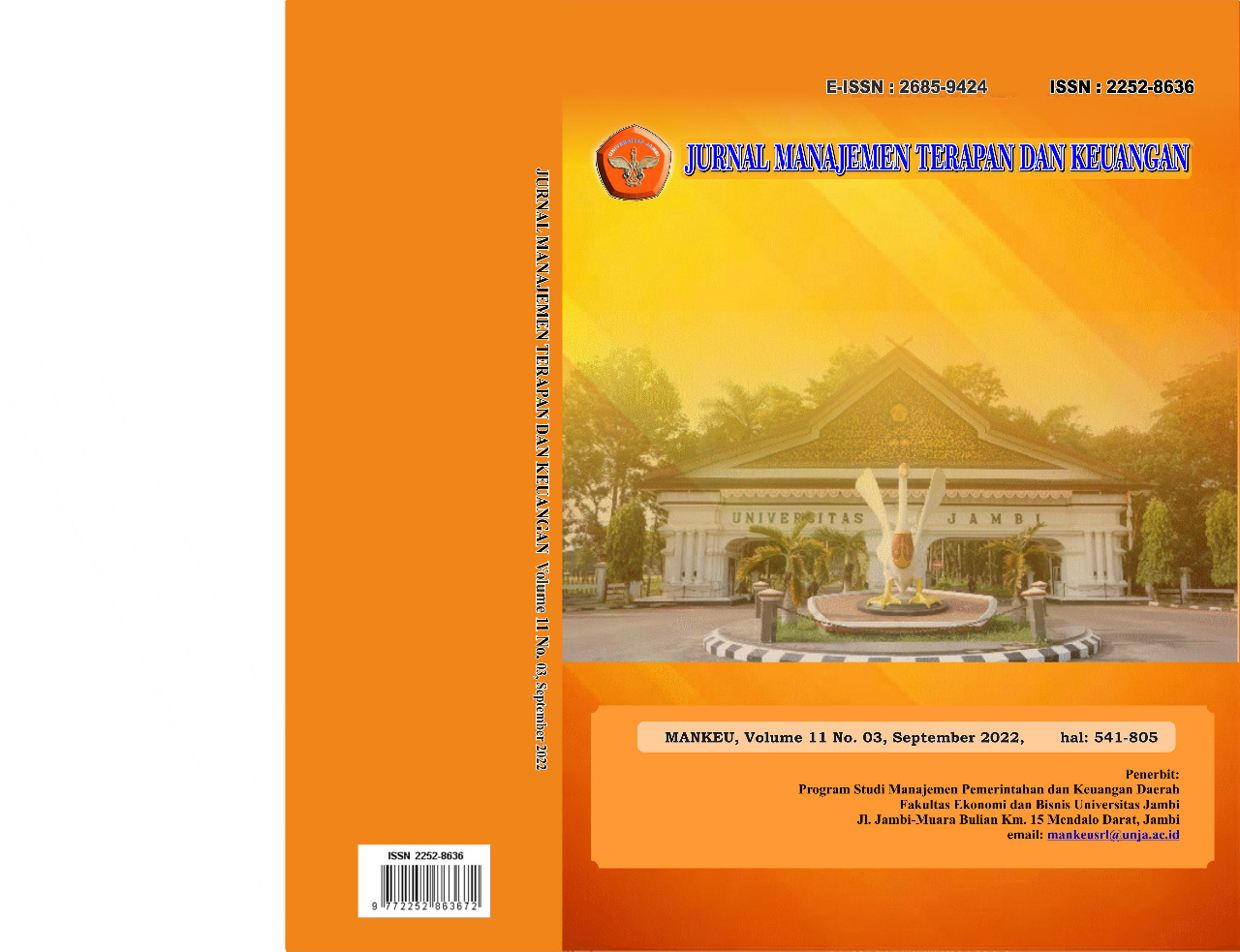PENGARUH SERVANT LEADERSHIP TERHADAP KINERJA PEGAWAI MELALUI MOTIVASI KERJA SEBAGAI VARIABEL MEDIATOR
DOI:
https://doi.org/10.22437/jmk.v11i04.16238Abstract
Penelitian ini bertujuan untuk menganalisa : 1) Pengaruh Servant Leadership terhadap kinerja pegawai; 2) Pengaruh Servant Leadership terhadap motivasi kerja terhadap kinerja pegawai; 3) Pengaruh Motivasi terhadap kinerja pegawai; 4) Pengaruh tidak langsung Servant Leadership terhadap kinerja pegawai melalui motivasi. Penelitian ini merupakan penelitian Survey menggunakan Statistik Inferensial melalui Analisa Jalur (Path Analysis) yang digunakan untuk menguji hipotesis dari hubungan yang dimediasi. Dalam mengestimasi mediasi dalam model penelitian, peneliti menggunakan data Cross Sectional yang diperoleh dari 70 Responden penelitian yang tersebar di Jambi secara simple random sampling. Hasil penelitian menunjukkan bahwa: 1) Terdapat pengaruh yang signifikan antara Servant Leadership dengan motivasi kerja pada pegawai; 2) Tidak terdapat pengaruh yang signifikan antara Servant Leadership dengan kinerja pada pegawai; 3) Terdapat pengaruh yang signifikan dengan hubungan yang tidak searah antara motivasi dengan kinerja pada pegawai; 4) Terdapat pengaruh langsung Servant Leadership secara positif dan signifikan terhadap kinerja pegawai dengan motivasi kerja
Downloads
References
Barbuto, J. E. Jr. and Wheeler, D. W. (2006). Scale Development and Construct Clarification of Servant Leadership. 31(3), 300–326. https://doi.org/https://doi.org/10.1177/1059601106287091.
Davis, K., & Newstrom, J. W. (n.d.). Werther (1996). Perilaku Dalam Organisasi (Terjemahan Oleh Dharma), Jilid I, Edisi Ketujuh, Penerbit Erlangga, Jakarta.
Eva, N., Robin, M., Sendjaya, S., van Dierendonck, D., & Liden, R. C. (2019). Servant leadership: A systematic review and call for future research. The Leadership Quarterly, 30(1), 111–132.
Feigenbaum, A. V. (1991). Total quality control. New York.
Frost, P. . (2003). Toxic emotion at work: Howcompassionate managers handle pain and conflict. Harvard Business School Press.
Greenleaf, R. K. (2002). Servant leadership: A journey into the nature of legitimate power and greatness. Paulist Press.
Greenleaf, R. K., Frick, D. M., & Spears, L. C. (1996). The private writings of Robert K Greenleaf: On becoming a servant leader. San Francisco: Jossey-Bass Publishers.
Guillén, C. (2000). PsicologÃa del trabajo para relaciones laborales. McGraw-Hill.
Lantu, D. C. (2015). Servant leadership and human capital management: Case study in Citibank Indonesia. Procedia-Social and Behavioral Sciences, 169, 303–311.
Lee, C., & Zemke, R. (1993). The search for spirit in the workplace. Training, 30(6), 21–27.
Liden, R., Wayne, S., Zhao, H., & Henderson, D. (2008). Multi-level approaches to leadership. The Leadership Quarterly, 19(2), 161–177.
Luo, J., & Zheng, J. (2018). The impact of servant leadership on proactive behaviors: A study based on cognitive evaluation theory. Psychology, 9(05), 1228.
Mayo, A. R. P., Torres, F. R., & Nieto, N. R. (2018). The motivation and performance in the human resource of a university organization in the State of Morelos. Open Journal of Business and Management, 6(3), 678–687.
Priyatno, D. (2010). Paham analisa statistik data dengan SPSS. Yogyakarta: Mediakom.
Reeve, J. (2010). Motivacion y Emocion. McGraw-Hill.
Sekaran, U., & Bougie, R. (2019). Research methods for business: A skill building approach. john wiley & sons.
Spears, L. (1996). Reflections on Robert K. Greenleaf and servantâ€leadership. Leadership & Organization Development Journal.
Sugiyono, D. (2013). Metode penelitian pendidikan pendekatan kuantitatif, kualitatif dan R&D.
Sujianto, A. E. (2009). Aplikasi statistik dengan SPSS 16.0. Jakarta: Prestasi Pustaka, 97.
Van Dierendonck, D., & Patterson, K. (2010). Servant leadership: Developments in theory and research. Springer.
Downloads
Published
How to Cite
Issue
Section
License
Copyright (c) 2022 Zarkani Zarkani, Tona Aurora Lubis

This work is licensed under a Creative Commons Attribution 4.0 International License.






